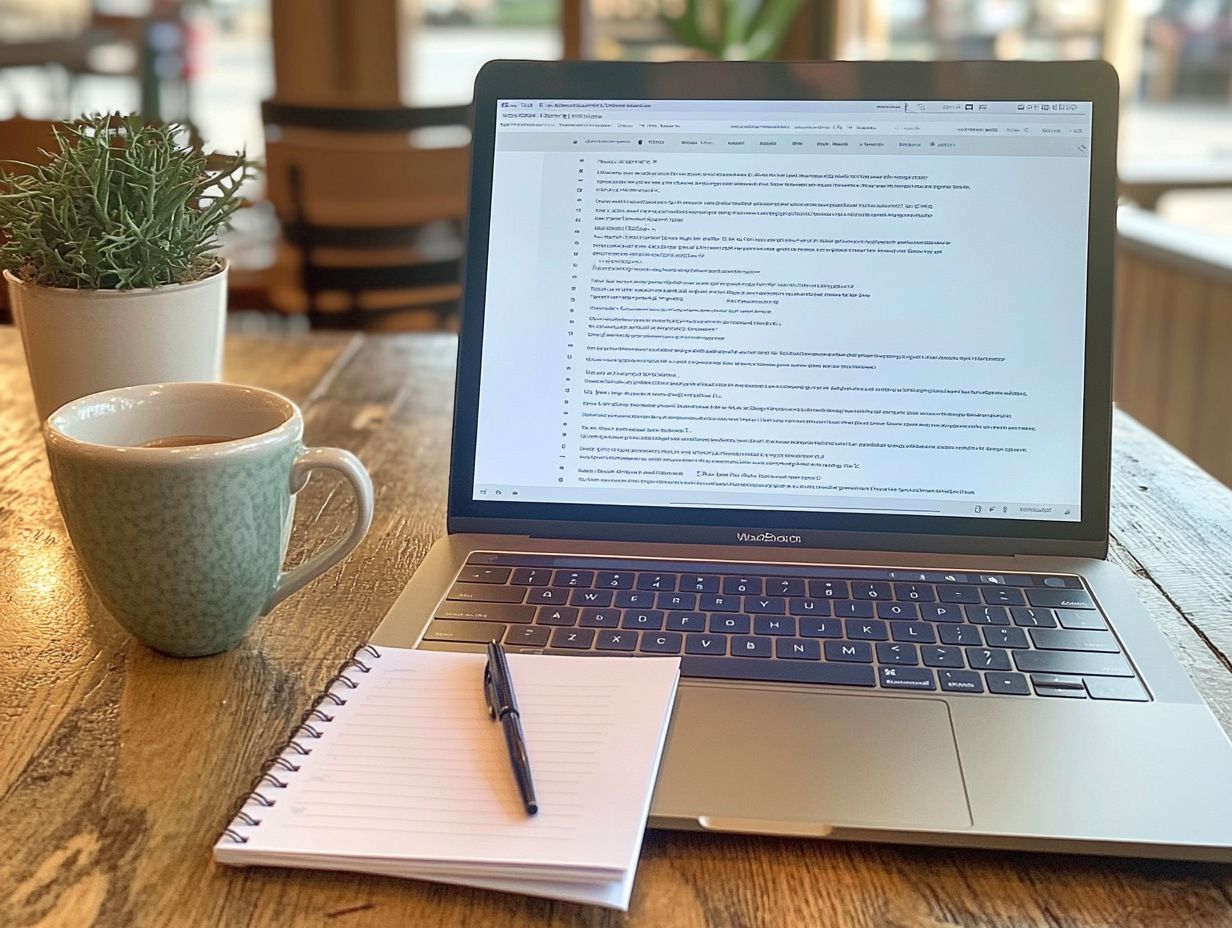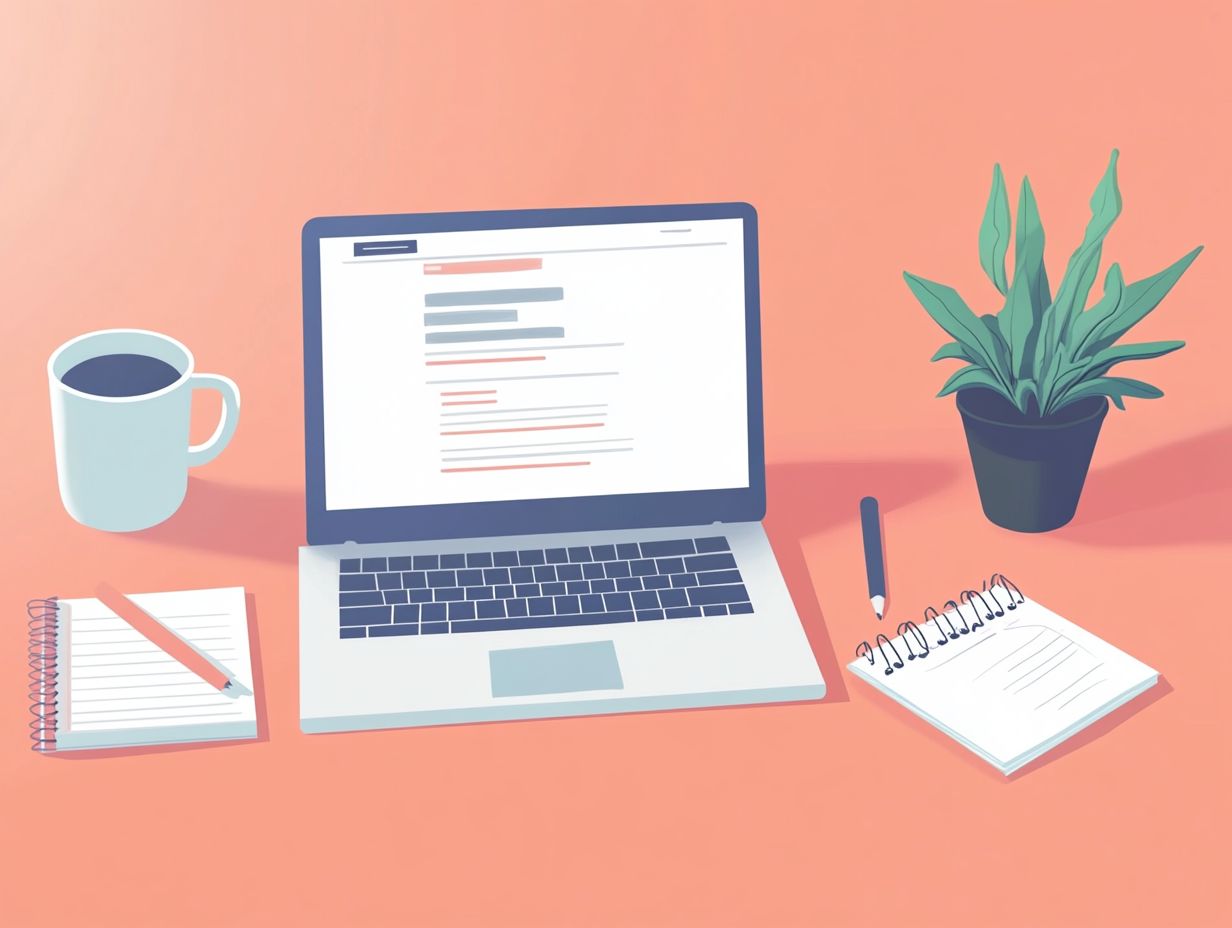5 Tips to Ace Your Internship Application
Securing an internship can be a pivotal moment in your career journey. It provides invaluable experience and networking opportunities that shape your professional future.
This guide presents five essential tips to help you master your internship application. It starts with the importance of early research and extends to personalizing your resume and cover letter.
You will also discover the many benefits of internships, the various types available, and how they can boost your career growth.
Additionally, you’ll learn about common pitfalls to avoid and the key skills you should highlight to ensure your application stands out.
Whether you re a first-time applicant or someone looking to refine your strategy, this guide equips you with the insights necessary to succeed.
Contents
- Key Takeaways:
- 1. Start Early and Do Your Research
- 2. Tailor Your Resume and Cover Letter to the Company
- 3. Network and Utilize Your Connections
- 4. Prepare for the Interview
- 5. Follow Up and Thank the Interviewer
- What Are the Benefits of Completing an Internship?
- What Are the Different Types of Internships?
- How Can an Internship Help with Career Development?
- What Are Some Common Mistakes to Avoid When Applying for an Internship?
- How Can an Internship Lead to a Full-Time Job Opportunity?
- What Skills and Experiences Should Be Highlighted in an Internship Application?
- Frequently Asked Questions
- What are the top 5 tips for acing your internship application?
- How important is networking in the internship application process?
- Should I customize my resume and cover letter for each internship application?
- How can I showcase my skills and experiences in my internship application?
- What can I do to prepare for internship interviews?
- Is it necessary to follow up with the company after submitting my internship application?
Key Takeaways:
- Start early and research the company to tailor your application.
- Customize your resume and cover letter to stand out.
- Network for potential internship opportunities.
- Prepare for interviews by practicing.
- Follow up with thank you notes to show professionalism.

1. Start Early and Do Your Research
Starting early and conducting thorough research is crucial for securing an internship in the competitive financial industry. Given the high demand for talented candidates in finance-related fields, applying early places you in a strong position among many students competing for limited slots at prestigious financial institutions like Goldman Sachs and Morgan Stanley.
This proactive approach showcases your genuine interest and allows you to explore potential companies that align with your career aspirations. When you invest time in understanding a company’s culture, values, and opportunities, you enhance your job search strategies, making yourself more appealing to recruiters.
Utilizing platforms like Handshake and LinkedIn can further streamline your efforts, offering access to employer insights, networking opportunities, and application timelines. By tapping into these resources, you increase your chances of finding an internship that aligns perfectly with your goals, laying a solid foundation for your future career.
2. Tailor Your Resume and Cover Letter to the Company
Tailoring your resume and cover letter to align with the specific requirements of the company is a crucial step in the internship application process. To enhance your chances further, consider learning how to make the most of your internship experience, as this can truly set you apart from the competition.
By demonstrating a clear understanding of the company’s culture and values, you enhance your candidacy and make a compelling case for your fit within the organization. It s essential to analyze the job description, spotlighting relevant skills and experiences that directly address the employer s needs.
When crafting your resume, focus on measurable successes and specific contributions in previous roles that resonate with the financial sector.
Your cover letter should clearly express your enthusiasm for the internship while highlighting a proactive approach to industry challenges, showcasing how you can effectively contribute to the team s goals.
3. Network and Utilize Your Connections
Leveraging networking opportunities and utilizing personal connections are essential strategies for navigating your internship search, especially in the competitive landscape of the financial industry.
Attending career fairs and industry events provides prime opportunities to meet seasoned professionals who can offer invaluable insights. Engaging in conversations at these gatherings helps you build rapport and opens doors to connections that may be inaccessible through traditional channels.
Maintaining these relationships is crucial, as they often lead to referrals that can significantly enhance your chances of landing internships. Regular follow-ups and expressing genuine interest in their work can nurture these connections, making it more likely that they will remember you when opportunities arise. This proactive approach ultimately increases your chances of success in your internship journey.
4. Prepare for the Interview

Proper preparation for the interview is essential for you as an aspiring intern, especially in the financial industry. Understanding how internships prepare you for the workforce can help you showcase the specific skills and experience that organizations seek to assess candidates effectively.
Start with a varied approach by thoroughly researching the company. Understand its culture and values along with any recent developments. This knowledge can truly set you apart!
Practice common interview questions to improve your responses and clearly communicate your suitability for the role. Be ready to discuss your unique skills and experiences, which can enhance how you present yourself.
After the interview, regardless of the outcome, seek feedback. This invaluable step supports your personal and professional growth by helping you identify areas for improvement and refine your future performances.
Ultimately, feedback boosts your chances of success in this competitive field.
5. Follow Up and Thank the Interviewer
Following up and expressing gratitude to your interviewer can leave a remarkable impression and strengthen your professional connections within the financial industry.
Such gestures convey appreciation for the opportunity and highlight your genuine interest. In your thank-you email, reiterate your enthusiasm for the role while referencing key discussion points from the interview.
This approach demonstrates your attentiveness and creates a personalized touch, reminding the interviewer of your insights and how they align with their objectives. By expressing eagerness to make a positive contribution, you reinforce the notion that you are a proactive candidate.
This significantly enhances your chances of standing out in a competitive job market.
What Are the Benefits of Completing an Internship?
Completing an internship opens the door to numerous benefits, including valuable chances to grow professionally that can enhance your resume and elevate your job search efforts.
These experiences immerse you in the financial sector, providing critical industry exposure that helps you understand its inner workings. Internships also serve as an excellent platform for building professional relationships, which foster mentorship and networking opportunities.
As you acquire specialized skills during your internship, you align with your career ambitions, preparing for future roles. Many internships act as stepping stones to full-time positions within the organization, solidifying your place in the financial industry’s competitive landscape.
What Are the Different Types of Internships?
Internships in the financial industry present a diverse array of options, including paid internships, unpaid internships, and summer internships.
In a paid internship, you typically engage in projects that align with the company s objectives while earning a stipend or hourly wage. This can significantly alleviate any financial stress you might be facing.
While unpaid internships may seem less appealing due to the lack of compensation, they can provide invaluable experience and networking opportunities that may pave the way for future job offers.
Summer internships let you immerse yourself in the field during your academic break, though they can vary widely in structure and expectations. Weigh the pros and cons of each option by assessing your career goals and how these internships align with your financial circumstances.
This will enable you to make informed decisions.
How Can an Internship Help with Career Development?

An internship can greatly enhance your career development. It provides hands-on experience in finance-related fields that improve your skills and strengthen your resume, ultimately leading to future job offers.
These opportunities act as essential stepping stones for those aiming to build a strong professional network. They connect you with industry experts who can offer valuable guidance and mentorship. Many interns find that the relationships they forge during their internships often blossom into job offers once they graduate.
Engaging in practical experiences helps you refine your career aspirations, which in turn informs your educational choices or further training in specialized areas.
Whether you secure a full-time position at the firm or earn a glowing recommendation for a graduate program, internships play a pivotal role in shaping a successful career trajectory.
What Are Some Common Mistakes to Avoid When Applying for an Internship?
Many candidates make common mistakes when applying for internships. To avoid these pitfalls, it’s crucial to understand how to write an impressive internship CV, as these errors can hurt their chances of landing a desired position in finance.
One prevalent misstep is submitting generic applications that fail to showcase your specific skills and experiences relevant to the role. This lack of personalization can cause you to blend into the crowd, severely diminishing your chances of standing out.
Another frequent oversight is neglecting to tailor your resume. It should clearly illustrate your accomplishments and competencies in alignment with the internship’s expectations. For further insights, check out how to stay motivated during your internship.
Insufficient preparation for interviews can lead to missed opportunities. It’s crucial that you practice common interview questions and thoroughly research the organization.
By addressing these errors, you can significantly enhance your prospects and streamline the overall application process.
How Can an Internship Lead to a Full-Time Job Opportunity?
Internships often act as a gateway to full-time job opportunities. They give you the chance to showcase your skills and cultivate professional relationships that could lead to job offers.
By actively demonstrating your competence and commitment throughout your internship, you leave a lasting impression on your supervisors and team members. This highlights your potential value to the organization and nurtures a sense of trust and reliability.
Engaging in meaningful conversations, participating in team projects, and seeking constructive feedback are essential steps in this journey. In the ever-evolving world of finance, maintaining a network of relationships with colleagues and mentors can open doors to future job prospects and career advancement, making this phase vital for your long-term success.
What Skills and Experiences Should Be Highlighted in an Internship Application?
When you craft your internship application, it’s crucial to highlight the skills and experiences that resonate with what employers in the financial industry seek. To enhance your chances, consider strategies on how to make your application stand out. This includes showcasing both your technical expertise and your soft skills, like communication and analytical thinking.
Employers are drawn to candidates who can articulate their thought processes clearly and analyze data with confidence. A compelling resume should include examples where you ve put these skills to use think successful presentations or significant contributions to team projects. Time management is another vital skill you shouldn t overlook; you need to show that you can prioritize tasks and meet deadlines effectively.
Incorporating specific achievements into your cover letter can further underscore these competencies, creating a vivid picture of the potential value you can bring to prospective employers.
Frequently Asked Questions
In this section, we address common queries related to internships and career development.

What are the top 5 tips for acing your internship application?
The top tips for acing your internship application are networking, customizing your resume and cover letter, and showcasing your skills. To enhance your chances, learn how to prepare for an internship interview and remember to follow up with the company.
How important is networking in the internship application process?
Networking is vital. It helps you connect and learn about the industry and company.
Should I customize my resume and cover letter for each internship application?
Yes, it’s strongly suggested to tailor your resume and cover letter for each application. This shows you ve researched the company and can highlight your relevant skills.
How can I showcase my skills and experiences in my internship application?
Provide specific examples and measurable results. Mention projects, awards, and skills gained through classes or activities.
What can I do to prepare for internship interviews?
Research the company and practice common interview questions. Dress professionally and arrive early; confidence is key!
Is it necessary to follow up with the company after submitting my internship application?
Yes, following up demonstrates your enthusiasm for the position. Make sure to do it professionally and in a timely manner!






